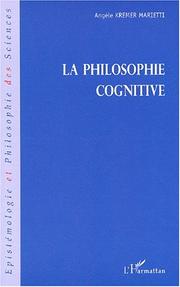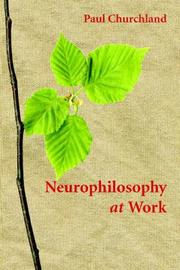| Listing 1 - 10 of 12 | << page >> |
Sort by
|

ISBN: 2747516407 9782747516402 Year: 2001 Publisher: Paris : L'Harmattan,
Abstract | Keywords | Export | Availability | Bookmark
 Loading...
Loading...Choose an application
- Reference Manager
- EndNote
- RefWorks (Direct export to RefWorks)
Cognition --- Knowledge, Theory of. --- Cognition. --- Philosophy. --- Cognition - Philosophy. --- Philosophie de l'esprit. --- Philosophie et neurosciences. --- Philosophie.
Book
ISBN: 0262132885 0262631628 0262279908 0585022526 9780585022529 9780262279901 9780262631624 9780262132886 Year: 1993 Publisher: Cambridge, Mass. MIT
Abstract | Keywords | Export | Availability | Bookmark
 Loading...
Loading...Choose an application
- Reference Manager
- EndNote
- RefWorks (Direct export to RefWorks)
"This collection of essays serves both as an introduction to Ruth Millikan's much-discussed volume Language, Thought, and Other Biological Categories and as an extension and application of Millikan's central themes, especially in the philosophy of psychology. The title essay discusses meaning rationalism and argues that rationality is not in the head, indeed, that there is no legitimate interpretation under which logical possibility and necessity are known a priori. In other essays, Millikan clarifies her views on the nature of mental representation, explores whether human thought is a product of natural selection, examines the nature of behavior as studied by the behavioral sciences, and discusses the issues of individualism in psychology, psychological explanation, indexicality in thought, what knowledge is, and the realism/antirealism debate."--Pub. desc.
Cognitive psychology --- Developmental psychology --- Theory of knowledge --- Cognition --- Psychobiology --- Biological psychology --- Biopsychology --- Biology --- Human behavior --- Psychology --- Biological psychiatry --- Psychobiology. --- Philosophy. --- Cognition. --- Psychobiologie --- Social Sciences --- Cognition - Philosophy.
Book
ISBN: 9780415809603 9780415809573 9781315771892 9780203712511 020371251X 1315771896 9781351362979 1351362976 9781351362955 135136295X 9781351362962 1351362968 9781138559561 9781138559578 0415809576 0415809606 1138559563 1138559571 Year: 2015 Publisher: London Routledge, Taylor & Francis Group
Abstract | Keywords | Export | Availability | Bookmark
 Loading...
Loading...Choose an application
- Reference Manager
- EndNote
- RefWorks (Direct export to RefWorks)
"The philosophy of animal minds addresses profound questions about the nature of mind and the relationships between humans and other animals. In this fully revised and updated introductory text, Kristin Andrews introduces and assesses the essential topics, problems and debates as they cut across animal cognition and philosophy of mind, citing historical and cutting-edge empirical data and case studies throughout. The second edition includes a new chapter on animal culture. There are also new sections on the evolution of consciousness and tool use in animals, as well as substantially revised sections on mental representation, belief, communication, theory of mind, animal ethics and moral psychology. Further features such as chapter summaries, annotated further reading and a glossary make The Animal Mind second edition an indispensable introduction to those teaching philosophy of mind, philosophy of animal minds, or animal cognition. It will also be an excellent resource for those in fields such as ethology, biology and psychology"--
Animal ethology and ecology. Sociobiology --- Theory of knowledge --- Cognition in animals --- Animal behavior --- Cognition --- Philosophy of mind --- Philosophy --- Cognition - Philosophy --- Cognition in animals. --- Animal behavior. --- Philosophy.
Book
ISBN: 0814725902 Year: 1988 Publisher: New York London New York University Press
Abstract | Keywords | Export | Availability | Bookmark
 Loading...
Loading...Choose an application
- Reference Manager
- EndNote
- RefWorks (Direct export to RefWorks)
Cognition --- -Developmental psychology --- -#psyc:1993.1 --- Development (Psychology) --- Developmental psychobiology --- Psychology --- Life cycle, Human --- Philosophy --- Freud, Sigmund --- Developmental psychology --- #psyc:1993.1 --- Freud, Sigmund, --- Cognition - Philosophy. --- Developmental psychology - Philosophy. --- Freud, Sigmund, 1856-1939.

ISBN: 0521692008 9780521864725 9780521692007 0521864720 9780511498435 1107169569 9786610815685 0511274793 0511275498 0511498438 0511321473 128081568X 0511273258 0511274041 Year: 2007 Publisher: Cambridge Cambridge University Press
Abstract | Keywords | Export | Availability | Bookmark
 Loading...
Loading...Choose an application
- Reference Manager
- EndNote
- RefWorks (Direct export to RefWorks)
Churchland explores the unfolding impact of the several empirical sciences of the mind, especially cognitive neurobiology and computational neuroscience on a variety of traditional issues central to the discipline of philosophy. Representing Churchland's most recent research, they continue his research program, launched over thirty years ago which has evolved into the field of neurophilosophy. Topics such as the nature of Consciousness, the nature of cognition and intelligence, the nature of moral knowledge and moral reasoning, neurosemantics or world-representation in the brain, the nature of our subjective sensory qualia and their relation to objective science, and the future of philosophy itself are here addressed in a lively, graphical, and accessible manner. Throughout the volume, Churchland's view that science is as important as philosophy is emphasised. Several of the color figures in the volume will allow the reader to perform some novel phenomenological experiments on his/her own visual system.
Philosophical anthropology --- Neurosciences --- Cognition --- Religion and science --- Philosophy --- Religion and science. --- Philosophy. --- Christianity and science --- Geology --- Geology and religion --- Science --- Science and religion --- Psychology --- Religious aspects --- Arts and Humanities --- Neurosciences - Philosophy --- Cognition - Philosophy
Book
ISBN: 9780262526012 9780262014601 0262014602 0262289792 0262526018 1282978497 9786612978494 Year: 2011 Publisher: Cambridge, Mass. MIT
Abstract | Keywords | Export | Availability | Bookmark
 Loading...
Loading...Choose an application
- Reference Manager
- EndNote
- RefWorks (Direct export to RefWorks)
This book presents the framework for a new, comprehensive approach to cognitive science. The proposed paradigm, enaction, offers an alternative to cognitive science's classical, first-generation Computational Theory of Mind (CTM). Enaction, first articulated by Varela, Thompson, and Rosch in 'The Embodied Mind', breaks from CTM's formalisms of information processing and symbolic representations to view cognition as grounded in the sensorimotor dynamics of the interactions between a living organism and its environment.
Philosophy and cognitive science --- Cognition --- Cognitive science --- Cognitive science and philosophy --- Science --- Philosophy of mind --- Psychology --- Philosophy --- Cognitive psychology --- Cognition - Philosophy --- Philosophy and cognitive science. --- Cognitive science. --- Philosophy. --- PHILOSOPHY/Philosophy of Mind/General
Book
ISBN: 9780393927955 0393927954 Year: 2009 Publisher: New York, N.Y. W.W. Norton
Abstract | Keywords | Export | Availability | Bookmark
 Loading...
Loading...Choose an application
- Reference Manager
- EndNote
- RefWorks (Direct export to RefWorks)
Brain --- Cognition --- Cognitive sience --- Cognitive neuroscience. --- Neuropsychology. --- Cerveau --- Neurosciences cognitives --- Neuropsychologie --- Physiology --- Physiological aspects --- Physiologie --- Aspect physiologique --- Cognitive neuroscience --- Cognitive science --- Neuropsychology --- physiology --- Philosophy --- Cognitive psychology --- Physiology of nerves and sense organs --- Brain - physiology --- Cognition - Philosophy
Book
ISBN: 0262018543 0262312174 1283906406 9780262312172 9781283906401 9780262018548 Year: 2013 Publisher: Cambridge, Mass.
Abstract | Keywords | Export | Availability | Bookmark
 Loading...
Loading...Choose an application
- Reference Manager
- EndNote
- RefWorks (Direct export to RefWorks)
Hutto and Myin promote the cause of a radically enactive, embodied approach to cognition which holds that some kinds of minds - basic minds - are neither best explained by processes involving the manipulation of contents nor inherently contentful. It opposes the widely endorsed thesis that cognition always and everywhere involves content. The authors defend the counter-thesis that there can be intentionality and phenomenal experience without content, and demonstrate the advantages of their approach for thinking about scaffolded minds and consciousness.
Cognition -- Philosophy. --- Cognitive science. --- Content (Psychology). --- Philosophy and cognitive science. --- Philosophy of mind. --- Cognition --- Philosophy and cognitive science --- Philosophy of mind --- Cognitive science --- Content (Psychology) --- Social Sciences --- Psychology --- Philosophy --- Philosophy. --- Mental content --- Mind, Philosophy of --- Mind, Theory of --- Theory of mind --- Cognitive science and philosophy --- Science --- Metaphysics --- Philosophical anthropology --- PHILOSOPHY/Philosophy of Mind/General --- COGNITIVE SCIENCES/General
Book
ISBN: 0262014033 9786612638275 0262266024 1282638270 9780262266024 9781282638273 9780262014038 Year: 2010 Publisher: Cambridge, Mass. MIT Press
Abstract | Keywords | Export | Availability | Bookmark
 Loading...
Loading...Choose an application
- Reference Manager
- EndNote
- RefWorks (Direct export to RefWorks)
Leading scholars respond to the famous proposition by Andy Clark & David Chalmers that cognition & mind are not located exclusively in the head.
Cognition -- Philosophy. --- Electronic books. -- local. --- Externalism (Philosophy of mind). --- Philosophy of mind. --- Externalism (Philosophy of mind) --- Cognition --- Philosophy of mind --- Philosophy --- Speculative Philosophy --- Philosophy & Religion --- Philosophy. --- Mind, Philosophy of --- Mind, Theory of --- Theory of mind --- Cognitive science --- Metaphysics --- Philosophical anthropology --- Psychology --- PHILOSOPHY/Philosophy of Mind/General --- COGNITIVE SCIENCES/General
Book
ISBN: 3839424623 Year: 2014 Publisher: Bielefeld transcript Verlag
Abstract | Keywords | Export | Availability | Bookmark
 Loading...
Loading...Choose an application
- Reference Manager
- EndNote
- RefWorks (Direct export to RefWorks)
Animal minds and animal ethics - different origins, connecting similarities. Philosophers working on questions of animal ethics usually draw on research into animal cognition and subscribe to strong positions regarding animal minds. Whereas philosophers interested in the question of animal minds sometimes draw ethical conclusions from the positions they argue for. In spite of such overlaps, these two areas of research have grown up separately. One reason for this separation stems from the institutional distinction between theoretical and practical philosophy. The principal aim of this anthology is to build bridges between the fields and different philosophical approaches of animal ethics and of animal minds and cognition. »Der Band zeigt, wie sich das dilettantische Zurechtschneidern des Geistes der Tiere verhindern lässt. Die Auswahl der Arbeiten [...] bezeugt das konstruktive Potential der postmodernen Philosophie.« Philipp von Gall, TIERethik, 6/8 (2014) »Ein lesenswertes Buch.« Kochen ohne Knochen, 15/2 (2014) Reviewed in: Fellbeißer, 10 (2013) www.lehrerbibliothek.de, 21.01.2014, Dieter Bach fair-fish, 13.02.2014, Heinzpeter Studer
Ethics; Animal Ethics; Animal Minds; Animal Cognition; Philosophy of Mind; Human-Animal Studies; Animal; Animal Philosophy; Philosophy; Cultural Studies; Human Animal Studies --- Animal Cognition. --- Animal Ethics. --- Animal Minds. --- Animal Philosophy. --- Animal. --- Cultural Studies. --- Human Animal Studies. --- Human-Animal Studies. --- Philosophy of Mind. --- Philosophy.
| Listing 1 - 10 of 12 | << page >> |
Sort by
|

 Search
Search Feedback
Feedback About UniCat
About UniCat  Help
Help News
News